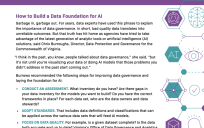 As I have written on my innovation blog post, city leaders everywhere are grappling with solving humanity’s greatest challenges, such as urbanization, aging infrastructure, climate change and income inequality to ensure that their citizens and future generations prosper. These ambitious leaders are thinking creatively to keep their communities thriving in the face of rapid economic and technological change, and are leaning on academia to help them define their Smart Cities strategies.
As I have written on my innovation blog post, city leaders everywhere are grappling with solving humanity’s greatest challenges, such as urbanization, aging infrastructure, climate change and income inequality to ensure that their citizens and future generations prosper. These ambitious leaders are thinking creatively to keep their communities thriving in the face of rapid economic and technological change, and are leaning on academia to help them define their Smart Cities strategies.
One such program is the Smart Cities Innovation Accelerator hosted by Harvard University’s professor Dr. David Ricketts. The Smart Cities Innovation Accelerator brings together senior executives across the public sector, technology, and higher education.
The ultimate goal of the Accelerators and Summits is impact. For this to happen, action is a critical component. The programs dedicate 25-50 percent of the time to action sessions with the participants. That format drives the discussion and ideas presented into an action set for both the participants and the broader community.
As a frequent participant, I have enjoyed the opportunity to join city leaders, and smart city subject matter experts to come together for two days, and tackle key issues that the community is sharing. My experiences included:
- Smart Districts in Dublin, – focused on the theme of ‘Smart Districts – how to deploy and scale’. At this event, there was a practical focus on the roll-out of smart districts. The “Docks”, a smart district in Dublin, generates over 9% of Ireland’s GDP, and is home to many of the world’s leading tech. companies and is the subject of one of Europe’s largest urban redevelopment projects.
- Leverage and Manage City Data in San Diego, – this event focused on the theme of how to leverage and manage city data. The discussions centered on data privacy, data sharing, collaboration with researchers, data monetization, and how to operationalize data management. Here is a replay of my interview at the event.
- Artificial Intelligence, in Toronto –focused on the use of artificial intelligence. Toronto, being a major global AI center was well suited to host city leaders and share their experience tackling public health leveraging city data.
- Mobility, in Las Vegas, –focused on the use of emerging technologies (AI, IoT, autonomous vehicles, analytics, machine learning, etc.) to drive innovation in mobility. The city of Las Vegas is a pioneer in testing autonomous vehicles and leveraging IoT in their Innovation District, and the participants had a lot to learn from the city
- Innovation, in Cambridge, Mass. focused on collaboration across departments in the cities, blockchain and customer experience. It was held on the Harvard campus in Cambridge which made it even more memorable.
Public sector leaders need all the help that they can get in defining their Smart Cities strategy. With programs like the Smart Cities Innovation Accelerator by Harvard, it’s clear that academia is leading the way in offering this guidance.
Franco Amalfi is a GovLoop Featured Contributor. He leads the go to market strategy for smarter government for Oracle Public Sector North America. Franco advises government officials on how to leverage modern cloud-based solutions and emerging technologies to help government organizations deliver personalized government services. In addition to working with customers, Franco authors, publishes white papers and articles on leveraging technology to drive business value for governments. He is also a frequent speaker at government conferences. He is a graduate of McGill University in Montreal, Canada and has completed an Advanced Certificate for Executives in Management, Innovation, and Technology at MIT Sloan School of Management in Cambridge, USA. You can read his posts here.





This is awesome, I couldn’t think of a better alternative for city leaders to turn to for guidance.
Glad you agree, Uyen, it’s a great program.